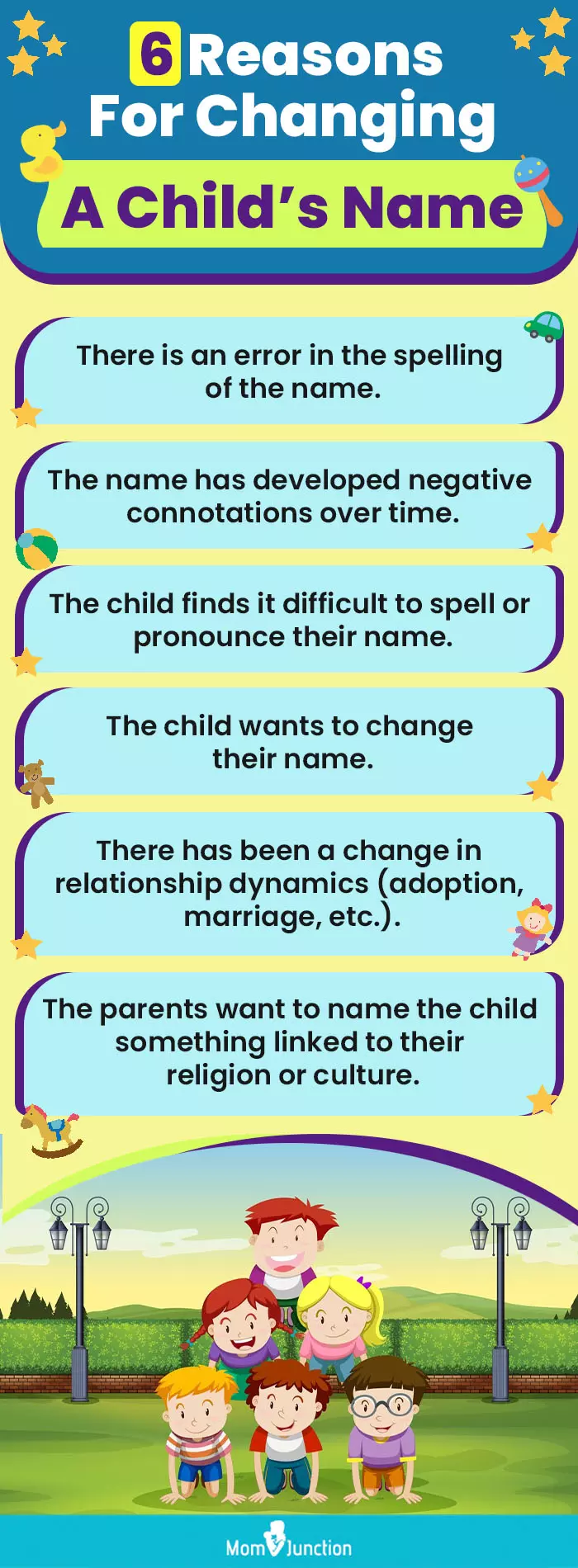
Image: Momjunction Design Team
If you are considering a name change for your child, you’re not alone. Wanting a name change can stem from various reasons like correcting errors on important papers, change in family structure, avoiding names with negative connotations, or simply based on personal preference. However, the process can be complex and requires understanding things including parental rights and state mandates. In this guide, we will explain the steps to alter your baby’s name, discuss valid justifications for doing so, and highlight important legal factors to consider. If you need help understanding the process or considering different options, this detailed guide will assist you in changing your child’s name with confidence and ease.
How Long Do You Have To Change Your Baby’s Name?
The time limit for changing your baby’s name depends on your state rules. Usually, you have up to 12 months to do it with ease. After the first year, the process becomes more formal and may require a court order. It’s important to check the respective state’s specific guidelines to ensure that the deadline has not been crossed.
What Are Some Valid Reasons For Changing A Child’s Name?
Changing a child’s name is a significant decision that can arise from various circumstances. Here are some reasons why parents might choose to change their child’s name:
- Correcting spelling errors: Spelling errors, common during the busy time of a child’s birth, might need correction on legal documents like the birth certificate.
- Personal preference: Parents may choose to rename their child if they find a name they prefer or regret their original choice.
- Avoiding negative associations: If a child’s name carries negative connotations or is associated with a negative event, parents may opt to change that name to prevent bullying or prejudice.
- Simplifying a complex name: Names that are difficult to pronounce or spell can cause ongoing issues for a child. Parents might decide to simplify their child’s name so it’s easier for everyone to say and spell.
- Child’s own request: As children grow older, they may express a desire to change their name for personal reasons, such as preferring a different name that aligns better with their identity.
- Family changes (marriage, divorce, adoption): Names might change due to family changes such as marriage, divorce, or adoption, with the latter often resulting in new names to signify inclusion in the family.
- To reflect religious or cultural identity: If the original name lacks ties to heritage or tradition, parents may want to choose a name that has ties to their culture or religion.
- Honoring family members: Parents may want to rename their child after a deceased family member or someone who has greatly influenced their lives.
 Did you know?
Did you know?George Herbert Walker Bush, the 41st President of America, was named after his maternal grandfather George Herbert Walker.
How To Legally Change Your Baby’s First Name
Changing your baby’s first name involves navigating various legal requirements that differ depending on your location. Below is a guide to help you through the process, including gathering the necessary documents, completing and submitting forms, and attending any required court hearings (1)(2)(3)(4)(5).
1. Before 12 months
Changing your baby’s name before they are 12 months old is easier and more straightforward. In many states, during that time frame, you can often make amendments to the birth certificate directly through your state’s vital records office, without needing to go to court.For instance, in Oregon, if the child is below one year, parents may request rectification or a name change without going to court. If they want to change the name a second time under this timeframe, a court order is required.
- Amend the birth certificate: Before the baby reaches 12 months, most states allow parents to amend the birth certificate directly through the state’s office of Vital Records.
- Typographical errors by birthing facility: In cases where errors are made by the birthing facility during initial entry, parents can contact the Amendments Unit for correction. Details to be provided include the child’s full name, date of birth, what the error reads on the certificate, and how the name should read. Verification of the error may be necessary. The vital records office will then contact the birthing facility for correction of the spelling mistakes.
- Change in child’s name: Parents may petition for a one-time name change of a child below 12 months without a court order. No additional evidence documentation is usually required to support the amendment for this one-time change, and there may be a nominal fee for the amendment depending on the state. Use the specific amendment form provided by your state’s vital records office and proceed according to the state’s guidelines.
 Quick fact
Quick fact2. After 12 months
Once your child is older than 12 months, the process of changing their name becomes more formal and involves several legal steps. This process ensures that the name change is thoroughly documented and legally recognized, requiring court involvement and public notice in some cases. Here’s how you can go about it:
- Check state laws: The rules and regulations pertaining to name change vary with each state. Hence, visit the respective state’s official government website to get accurate information.
- Complete forms: Get the necessary forms from the state’s vital records office or website.
- Provide identity proof: Carry documents like the original birth certificate to prove the identity of both the parent and the child.
- Submit the form: Submit the filled-out forms and required documents to the appropriate office. There might be a filing fee.
- Attend a hearing: A court hearing will be scheduled where a judge will review the petition and decide whether to approve or deny the name change request. The judge may ask questions at the hearing to ensure that the request is in the best interests of the child.
- Publish a notice: Some states may require publication of a name change notice in a local newspaper. This is to inform the community and allow them to raise any objections.
- Get a court order: A formal court order will be received upon approval of the name change petition by parents. This court order legally authorizes the name change and should be kept as an official record.
- Update legal documents: Once the name change is approved, update the baby’s social security card, medical records, and other important documents.
Note: These steps might vary depending on parental circumstances.
How Much Does It Cost To Change Your Baby’s Name?
There are several steps and associated fees involved in changing your baby’s name which can vary depending on your state. Here’s a breakdown of the expenses and considerations involved (6)(7)(8)(9):
1. Filing fees
- Filing the necessary forms: The filing fee generally ranges from $100 to $500, depending on the state. For example, in Massachusetts, the filing fee is $150, while in California, it ranges between $435 and $450.
- Court fees: If a court hearing is required to approve the name change, there may be additional court fees. These fees varies widely but often fall between $50 and $200. It will depend on the court that the appearance is at. For example, the fee is $65 for the New York City Civil Court and $210 for County and Supreme Courts.
2. Publication fees
These costs may vary from $15 to $200 depending on the newspaper as well as the size of the notice.
3. Age considerations
If your baby is older than 12 months the cost could be higher. Some states have different processes or higher fees for name changes after a certain age. However, for babies aged below one, a nominal amendment or correction fee is levied. In Oregon, the amendment or correction fee for babies below the age of 12 months is $35.
4. New birth certificate
Once the name change is approved, you’ll need to obtain a new birth certificate with the updated name. The cost for a new birth certificate is usually between $10 and $50. Some states may charge additional fees for processing.
5. Fee waivers
If you are unable to afford the fees involved with changing your baby’s name, then most states offer fee waivers. To be granted a waiver, you will be required to present documents on your financial status, including income or government benefits.
Things to Consider Before Changing Your Baby’s Name
Changing your baby’s name is a big decision that may affect both family members and the child. Hence it’s important to consider the important factors before the name change to ensure the decision is thoughtful and in the best interest of your child. These are key points to consider:
1. Emotional impact
- Future implications: When considering how to choose a baby name that perfectly fits your child, think about how the name change might affect your child emotionally as they grow older. Hence, it’s important to choose a name that will strengthen their identity.
2. Legal implications
- Legal process: Understand the legal steps required to change your baby’s name. This involves filing petitions, attending hearings, and maybe even publishing the name change.
- Document updates: Be prepared to update all official documents with the new name. This includes the birth certificate, Social Security records, medical records, and any other legal documents.
3. Family agreement
- Unified decision: Make sure all parents or guardians are on the same page about changing the name. This helps avoid conflicts and makes sure everyone is supportive of the decision.
- Joint consent: If custody is shared, you usually need legal consent from both parents or guardians to go ahead with the name change.
By carefully considering these factors, you can make a well-thought-out decision about changing your baby’s name, ensuring it is in their best interest and meets your family’s values and legal requirements.
Name Change Resources By State
Each state has specific resources and forms for changing a baby’s name. Check your state’s official website for the most accurate and detailed information. Here are a few links to get you started:
Name change for a child is a subject that demands thoughtfulness and care. Even celebrities like Kylie Jenner have faced this decision when Jenner and Travis Scott had to change their son’s name from Wolf to Aire because the former didn’t fit him. If you’re considering a name change, understanding the requirements and careful planning can help in executing this task easily. Remember, it’s important to consider the emotional impact, cultural significance, and legal procedures, and gain agreement from all involved. You must also remember to steer clear of banned baby names to avoid trouble later on. Ultimately, by approaching the name change with understanding and consideration, you can ensure that your baby’s name truly reflects their identity and brings them joy for years to come.
Discover More Names
When you have to choose a name for your baby, a few hundreds of names may not be just enough. Keep digging our mine of baby names until you find that one precious gem.
1. When is it too late to change my baby’s name?
There is no specific age limit for changing a baby’s name, but the process might become more complex as your child ages. If you delay it further, you may need to make the changes to all official documents, including school and social benefit documents.
2. Can both parents change a child’s name?
Yes, any parent can decide to change their child’s name, but states such as Nebraska and Texas require the consent of both parents or legal guardians to process the name change.
3. What could be done if one parent disagrees with the name change?
In most states, changing a child’s name requires the consent of both parents. However, a legal resolution may be needed if one parent or legal guardian disagrees. Additionally, the parents may seek the help of an expert to resolve the disagreement and select a name acceptable to both parties.
4. Does a child have to consent to a name change?
Usually, a minor’s consent is not necessary when changing their name. However, the legal name-changing process may require the approval of both the parents and the child’s legal guardians.
5. How long does a name change process take?
The process involved in changing a child’s name can take anywhere from a few days to a few months, depending on how quickly one obtains parental approval, gathers the required documents, and completes the legal procedures.
6. Will changing my child’s name affect their legal rights or benefits?
Changing your child’s name is unlikely to affect their legal rights or benefits. However, you will need to update their name on all relevant documents to ensure they continue to receive many of the benefits and legal entitlements.
Infographic: Why Do Parents Change Their Child’s Name?
Parents meticulously choose a baby’s name even before the little one arrives. However, certain circumstances may require them to change or alter the child’s name even after legal registration. Explore this infographic to learn about some common reasons that may warrant a name change by parents.
Illustration: Momjunction Design Team
Key Pointers
- Changing a child’s name may have emotional, legal, and financial implications.
- The rules and regulations for changing a child’s name can vary from state to state.
- The child’s name must be updated on every document once officially changed.
![]()

 PARENTING TIPS
PARENTING TIPS PREGNANCY
PREGNANCY BABY CARE
BABY CARE TODDLERS
TODDLERS TEENS
TEENS HEALTH CARE
HEALTH CARE ACTIVITIES & CRAFTS
ACTIVITIES & CRAFTS



